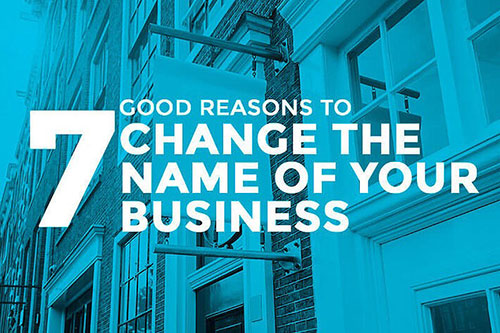During a business’s lifespan, a savvy owner may find themselves in the unenviable position of being forced to change the name of their business, due to any of a range of possible factors.
It’s a difficult process, involving contacting the IRS and the secretary of your state, applying for a new employer ID, and updating all of your business documents and graphics to reflect the change: and that’s even before you reach out to your customers. Still, sometimes the shift becomes necessary.
Companies ranging from Google (formerly known as BackRub) to Pepsi-Cola (originally called Brad’s Drink) have undergone the process and emerged as titans of today. If they can do it, you can to.
Why You Should Consider Changing Your Business Name
While changing the name of your business is a major decision that should not be taken lightly, there are seven critical reasons to consider making the change:
1. Your Current Company Name Can’t Be Copyrighted
A lack of copyright control can be very damaging the future of your business, as it prevents effective branding and can stifle revenue streams from advertising or merchandising. Depending on the reasons for the copyright issue, you might also be walking into a legal fight in the future if you choose to try to keep your current name.
2: Your Current Name is Hard to Remember
The importance of the stickiness of a name cannot be understated. Blue Ribbon Sports is much harder to remember than Nike, for example. Longer names or those involving foreign language phrases are much more likely to be vulnerable to this issue.
3. Repositioning
Consider changing your brand’s name when your business is poised to expand into a new market: a tea shop might need to consider a new logo at the very least if it were to add coffee to its repertoire, let alone something more radical like shifting to become a gaming café or sports bar.
4. You’ve Experienced Substantial Product Growth
This typically occurs when a product or service becomes so successful that the company actually becomes known by the name of that product or service. Examples include BestBuy, which descended from an electronics store that held a massive “best buy” sale at one of its store following a tornado strike, and 37Signals, which changed its name to Basecamp following the large-scale success of their product.
5. You’ve Expanded Geographically
Businesses can suffer from this when starting as a geographically local store – Albany Hardware would likely struggle in another town. This can also be problematic if your business name contains local dialect or is a reference to a local history item that wouldn’t make sense elsewhere.
6. Change of Ownership
Mergers and acquisitions can obviously have a large effect on the name of your business, as well. In an acquisition situation, the business being acquired might have its name changed to bring it into the family for branding purposes. If your company acquires another in a different city, you might consider renaming it to your brand name of city name – West Company of Farmington, for example.
Likewise, for mergers, both companies have some options available for naming conventions, ranging from a combined name, such as East-West Company, to a brand new name altogether. A lot of the decision process here comes down to message you want to send to your customers, and those of the merged company. Combining names suggests having a history and tradition that is not being forgotten, while a brand new name suggests the formation of something new and better than either constituent piece was by themselves.
7. Your Business’ Legacy Has Been Tarnished
While it is the goal of every business owner to maintain a strong public image, sometimes it can be tarnished through circumstances outside of your control. In these cases, it can be correct to change the name of your business to distance yourself from the past: you are a new business in the public eye, and you won’t make the same mistake again.
The Risks of Changing Your Brand Name
With any significant change, of course, there are risks. Your business is exposed to a certain level of danger, especially if your business exists in a small town where brand loyalty and brand history typically means a lot. There are also not-insignificant fiscal costs associated with the rebranding process, including a potential dip in business following the name change, as customers re-acclimate to your position in the region.
Names have power, and brand identity is something that is slow to change in the public consciousness, no matter how catchy the new name might be. If your business needs a change, make it, but don’t expect results overnight!
The change you desire might take several months or even years to fully be adopted in the customer’s eye, but it’ll be worth it in the long run.
If you’re considering changing your company name, that means you’re oging to need new branding collateral such as custom busines cards, brochures and catalogs. Check out what SILKCARDS has to offer:


